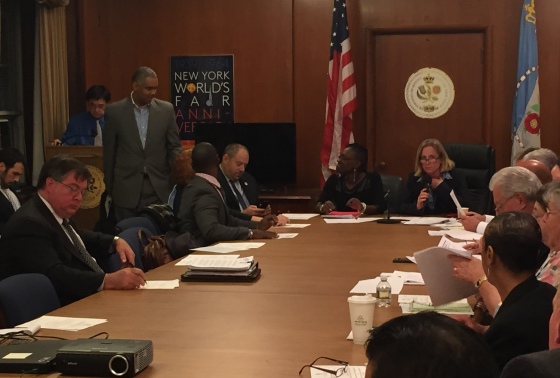
CB2 Chair Pat O’Brien (left)
Nov. 17, 2015 By Christian Murray
The leaders of Queens’ 14 Community Boards overwhelmingly rejected the City’s two new zoning amendments at borough hall last night, citing the loss of required parking spaces and the potential for overdevelopment.
All but two of the 14 boards voted against the “Zoning for Quality and Affordability” and “Mandatory Inclusionary Housing” text amendments, each a significant component of Mayor Bill de Blasio’s effort to create 200,000 units of affordable housing Citywide in the next 10 years.
Community Board 2, which covers Long Island City, Sunnyside and Woodside, voted against the amendments. Only Community Board 3 in Jackson Heights and Community Board 1 in Astoria supported it.
Pat O’Brien, chair of CB 2, told Queens Borough President Melinda Katz and other Community Board leaders that the amendments are steps toward additional development that the neighborhood cannot handle, reiterating concerns raised when his board overwhelmingly voted against the proposals earlier this month,
“Our board voted no,” O’Brien said. He added that while CB2 supports affordable housing, western Queens is probably undergoing more development than anywhere in the city.
“While it is exciting, it is frightening because there are no schools, there is insufficient transportation and no medical facilities and none of these things are funded for in the budget or planned to occur any time soon.”
O’Brien went on to tell Katz that “we don’t have an infrastructure that can bear what the result of this could be.”
One of the proposed amendments, called Zoning for Quality and Affordability (ZQA), was criticized by most of the boards since it would eliminate the parking requirements for affordable housing and affordable senior housing within a half mile of a subway station.
“The parking issue is the biggest issue bar none,” Katz said. “We have time before the City Council gets to vote and we have time to talk to the administration about this and hope it fixes the problem.”
The other text amendment, called Mandatory Inclusionary Housing (MIH), was also panned.
The amendment would require that developers who construct 10 units or more include 25 to 30 percent of permanently affordable housing when the site is located in a district that gets rezoned to increase housing capacity.
The amendment would also apply to private developers citywide who seek a zoning change for a specific project.
But some of the details were troublesome to the board.
One of its provisions irked a representative of Forest Hills-based Community Board 6. The provision permits developers to build the affordable units in a separate building or on an entirely separate property within the same community board or within half a mile.
This provision also alarmed Community Board 2.
The amendment also permits developers that build less than 25 units to pay into a fund in lieu of affordable housing. The boards were wary as to who would administer the fund and how would it be spent.
The Community Boards’ recommendations will be submitted to the City Planning Commission, which will review the amendments in mid December. The City Council, which has the final say on the amendments, is likely to vote on it early next year.
Katz will put out her own recommendation in coming days. Both Katz and the Community Boards’ opinions are advisory.
